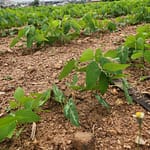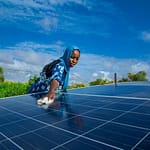The looming environmental crisis in Africa, driven by the relentless march of climate change, has been brought into sharp focus by a recent study conducted by economist Philip Kofi Adom. The findings paint a bleak picture, forecasting a decline in agricultural production, an increase in poverty, and a significant economic downturn if global warming is not curbed.
Adom’s research underscores the vulnerability of Africa’s agricultural sector. Projections indicate a 2.9% decline in agricultural production by 2030 and a staggering 18% decrease by 2050. This decline, coupled with a potential 30% loss in agricultural income, poses a severe threat to food security and places nearly 200 million people at risk of extreme hunger by 2050. In the face of these alarming statistics, Prof. Adom warns, “We will also face food security issues, and those working in the agricultural sector risk losing their jobs. Rural farmers who rely solely on rain and lack irrigation systems for their crops will be most affected.”
Beyond the agricultural sector, the economic repercussions are serious. Adom projects a long-term GDP decline of 7.12% for Africa as a whole by 2050, translating to a 20-30% increase in poverty compared to a scenario without climate change. This decline not only affects individual livelihoods but also has broader implications for wealth creation, business development, and job opportunities. Adom explains, “GDP tells us the state of the wealth of economies at a given time. Wealth creation leads to the creation of businesses and jobs. With a 7.12% drop in GDP, these potential drivers of wealth creation in the economy will be significantly hampered if climate change continues at its current rate.”
Read also: Youth-Led Innovations Pave the Way for Climate Solutions in Kenya
This also shines a spotlight on the role of multinational corporations, with Total Energies taking center stage. The French multinational’s involvement in extractive projects across Africa is characterized by a disregard for environmental protection, human rights, and the socioeconomic well-being of local communities.
In Mozambique, Total Energies’ $20 billion liquefied natural gas (LNG) deal has contributed to armed conflict and displacement, exacerbating regional instability. In Uganda, Total Energies is building the longest oil pipeline on the continent. The East African Crude Oil Pipeline (EA COP) project has been described as a “carbon bomb” that will emit more than 34 million metric tons of carbon dioxide every year for the next two decades. The pipeline will traverse areas of vital biodiversity, while Human Rights
Watch has reported that the project will displace 100,000 people, jeopardizing their lives and livelihoods.
Adom asserts, “Allowing multinational corporations to exploit our resources without regard for the consequences is a betrayal of our people. We must hold these corporations accountable for their actions.” The impacts of climate change are not limited to economic consequences but extend to the displacement of communities. In Côte d’Ivoire, where Total Energies is constructing a liquefied natural gas (LNG) regasification terminal, rising waters, increased storms, and coastal erosion have displaced thousands.
In AFCON host Côte d’Ivoire, where Total Energies was granted rights to construct a liquefied natural gas (LNG) regasification terminal in 2016, climate change has displaced thousands of residents of the once bustling hub of Grand Lahou amid rising waters, increased storms, coastal erosion, and intensifying local conflicts over shrinking resources. This edition of AFCON, typically held in June-July, was moved to January to safeguard against the uncertainty of the weather. If you watched the recent Africa Cup of Nations (AFCON) held in Ivory Coast, you must have noticed the ”unusual” breaks in each half
of play. Called cooling breaks, these intervals were meant to allow the players a few moments of rest and to rehydrate.
The breaks are a pointer to how drastically the climate situation on the continent has changed over the years. It has become hotter, more humid, and, sometimes, even unbearable for populations. “Accepting money from polluters in the name of sports is to abet climate crimes,” argues Dean Bhekumuzi Bhebhe, the Campaigns Lead at Power Shift Africa.
In the face of this unfolding crisis, Prof. Adom issues a resounding call to action. Governments must play a pivotal role in encouraging necessary change efforts, supporting private climate adaptation and mitigation initiatives through direct interventions or incentive measures. Households and businesses can play a vital role. For example, they can reduce their consumption of meat and dairy products or change their mode of transportation by opting for cycling, walking, or public transport, where possible. At home, we can adopt energy saving practices. Finally, green spaces must be respected and protected.
Watch the Car Manufacturer Innoson also Produces Mannequin for Selling Cloths on LIDA NETWORK
The climate crisis in Africa is not a distant concern but a pressing reality that demands immediate attention. Prof. Adom’s research serves as a wake-up call, emphasizing the need for collective action to mitigate the impending catastrophe. The role of multinational corporations, like Total Energies, must be scrutinized, and a commitment to sustainable practices is crucial for safeguarding Africa’s future. The time for action is now, and every individual must contribute to the collective effort to address the climate crisis on the continent.
Edited by: SAMWEL EVIATOR












